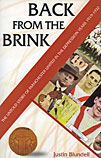 The Untold Story of Manchester United, 1919-1932
The Untold Story of Manchester United, 1919-1932
by Justin Blundell
Empire, £10.95
Reviewed by Joyce Woolridge
From WSC 245 July 2007
Manchester United’s recent affluence has been built upon two things: a ground that, according to Simon Inglis, has enjoyed one of the most “unhampered situations” of any major English stadium and two modern periods of success, under Matt Busby then Alex Ferguson. However, the move to Old Trafford in 1910, though it began auspiciously with the winning of United’s second title the following season, came close to putting the club out of business. It was poor timing to build a £60,000 stadium just before the outbreak of the First World War and the subsequent suspension of League football, though the wealthy brewer, John Davies, who undertook the relocation could hardly have known what lay in store.
Justin Blundell’s weighty book (it runs to 471 pages) gives a detailed account of what he terms United’s “Depression Years”, when the team’s woeful performances and a string of misfortunes led to speculation that the new ground had been cursed – according to one journalist, by Liverpool. Blundell also uncovers a litany of staggering directorial incompetence. The United board had, it seemed, the uncanny knack of selling the club’s best talents and buying “bargain” replacements that were anything but. The most important factor in condemning the club to yo-yoing between the top two divisions (with a narrow escape from the third) appears to have been the board’s prudent commitment to paying off the debts incurred by relocation and securing the freehold of the site. Not that their financial caution worked. By December 1931, after a decade of dismal football, the bank informed secretary Walter Crickmer that it was withdrawing a heavily indebted United’s credit.
There are detailed analyses of games and tactics culled from exhaustive research in the papers of the time, and Blundell has put flesh on the bones of the lesser known players of the period, who appeared alongside the better documented characters such as Billy Meredith and Frank Barson. The best section deals with the efforts of dissident fans to force a change. Told through contemporary reports, the attempts of G Greenhough, the head of the supporters’ club, to organise a match boycott may have been deemed a failure, but are none the less inspiring. Throughout Blundell quotes his sources at length. This is an excellent strategy as the quality of their prose and the restrained, ironic criticism is very enjoyable. But Blundell should have taken a leaf out of these inter-war correspondents’ books for his own writing.
The back cover describes his style as “amusing and irreverent”. What this actually means is that the text is peppered with a series of “jokes” that are at best unfunny and sometimes mildly offensive. The worst is a half-page comparison of United’s difficulties in escaping the Second Division with being in “an all-nude hot tub” with Ann Widdecombe, Cherie Blair, Kylie Minogue et al. There are also shorter sallies to savour about Stephen Hawking in goal, Princess Margaret’s bath, as well as endless references to genitalia, male and female. Not only do you find yourself reading through gritted teeth as you await the next barrage of witticisms, these digressions are distracting and confusing.